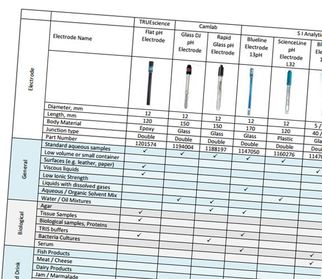How to choose a pH electrode
27 September 2016
27 September 2016
With pH electrodes available in such a wide variety of shapes, sizes and materials it can be difficult knowing where to begin to choose one.
We’ve looked at the key questions you need to ask when choosing a new pH electrode, and put together a table highlighting some common applications and the best electrode for them!

We’ve listed some of the most common pH applications and picked out the best electrodes for the job in our selector table here.

Of course you can use any pH electrode with an S7 connector on your TRUEscience pH cap – not just our brand, but any!
If your sample type isn’t listed on the selector table, or if you want to look at other options, just contact us to ask.
The right electrode is chosen based on two key areas – the sample and the connection.
To choose an appropriate pH electrode you need to look at the samples you will be measuring – this dictates what type of electrode you should choose.
Of course there are thousands of possible samples, each of which may have special requirements of their own, but the most common “difficult” samples to watch out for are;
(If you want to know more about what those terms mean, take a look at our previous pH Electrodes Jargon Buster post)
The second thing to consider after your sample is your meter’s connection.
TRUEscience meters accept any electrodes with a standard S7 connector – not just our own brand.
Other common connection types include BNC and DIN, though some manufacturers do make their own unique connector type. This can limit your electrode choices, so double check when purchasing a meter and make sure you can get a suitable probe for your samples.
If your application isn’t listed on our selector table, just contact us and we’ll be happy to help.